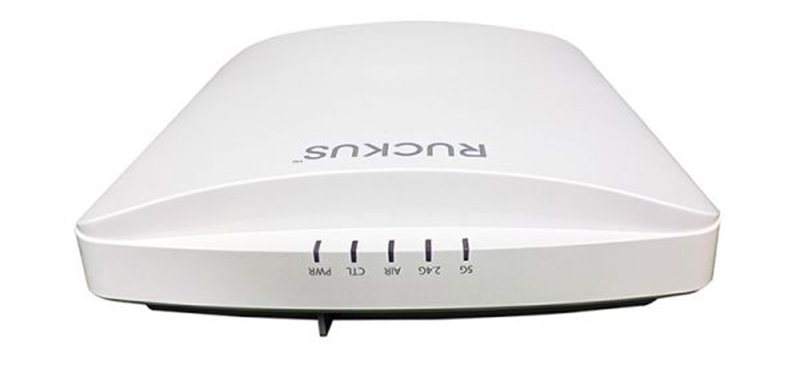There are many access points on the market, and each access point is manufactured by a different brand. However, you should always rely on quality to make the most of your network. Both Ruckus and Aruba’s access points have their own advantages and disadvantages, but your network requirements determine their applicability. Next we outline their main functions and highlight their differences.
Differences between Ruckus and Aruba
| Company | Ruckus | Aruba |
| Developed for | High density indoor environments | High density environments |
| Access points | Dual band with MU-MIMO | Dual band with MU-MIMO |
| Network management options | On-site or remote controllers (hardware, cloud, virtual, clustered or standalone) | Cloud, Local or on-premises |
| Security functions | DPSK patent technology, BYOD technology
| VPN, Firewall, Unlimited intrusion prevention, etc. |
| Performance | SmartCast and BeamFlex technology | Beam forming technology |
Ruckus vs. Aruba- Compare
Network Performance
Ruckus access points have better optimal performance and higher network efficiency than Aruba access points. The performance of the Ruckus access point is optimized in its radio frequency technology. Through the unique BeamFlex antenna technology, you can increase radio capacity and reduce co-channel interference, allowing you to comfortably enjoy a seamless network. In addition, Ruckus devices can transmit IPTV to ensure your multimedia applications.
Normally, Ruckus performs client load balancing, and it is equipped with airtime fairness to promote Wi-Fi to your slow device. In addition, it also has smart support for apps and frequency band control, allowing your dual-band device to connect to the 5 GHz frequency band to improve network efficiency. On the other hand, Aruba has beamforming technology to concentrate the signal on your device, so you can enjoy a stable network.
Network Security
Aruba provides a more secure network than Ruckus. Its security protocol has been standardized through 802.11 I, and it also provides a string firewall in its Aruba mobile controller. However, Ruckus also has BYOD technology and DPSK patented technology, which work together to ensure that your network has a subtle level of security.
Ruckus and Aruba-Comparison Overview
Ruckus
Ruckus’ innovative and personalized wireless video, voice and data technology, namely adaptive antenna ray, is used to extend the signal range and increase client data, thereby eliminating any Wi-Fi interference. In this way, you can ensure a strong and reliable network for all smart Wi-Fi devices.
Access point:Ruckus R750
The Ruckus R750 access point adopts a compact design and structure and is easy to deploy. It supports the Wi-Fi 6 standard, so it can provide your home and business with a faster, stronger and more reliable network.
It provides a total throughput speed of 3.5 Gbps for your connected devices. Its bandwidth speed is 1148 Mbps on the 2.4 GHz frequency band and 2400 Mbps on the 5 GHz frequency band. In this way, your low-bandwidth and high-bandwidth activities can be satisfied.
In addition, the performance of the Ruckus R750 access point is enhanced by the simultaneous dual-band function, which supports 8 spatial streams on its frequency band. It also has OFDMA and MU-MIMO technology, no matter how heavy your connection log load, you can provide a delay-free multi-user experience. With Ruckus virtual and physical cloud management options, you can easily configure and manage your network at any time.
Aruba
All of Aruba access points use AI-driven radio frequency optimization, intelligent management, dynamic segmentation, and intelligent operation of a wealth of users and applications. In addition, they have been optimized to support IoT devices running Wi-Fi, Bluetooth, Zigbee and other third-party protocols.
Access point:Aruba AP-335 Series
The Aruba AP-335 access point uses white color to enhance the beauty of your home, compact design and easy to deploy. It provides a total throughput speed of up to 2533 Mbps for your connected devices, 800 Mbps on the 2.4 GHz frequency band, and 1733 Mbps on the 5 GHz frequency band. Its dual-band function and MU-MIMO technology make it an efficient and high-performance network in a high-density environment. It has antenna polarization diversity to optimize radio frequency performance.
It comes with a built-in Bluetooth low energy radio and supports location-based services, allowing your device to receive signals from multiple Aruba beacons at the same time. It has unlimited scalability, allowing you to connect up to 1500 devices to your network without worrying about any connection failures. It uses adaptive radio management technology to provide airtime fairness, allocate channel and power settings and ensure that all your access points are free from any Wi-Fi interference. In addition, it also integrates wireless intrusion protection, which can protect your network when you use the Internet to identify, classify, and block malicious URLs and files.
A summary table for the Ruckus R750 and the Aruba AP-335
| Model | Ruckus R750 | Aruba AP-335 |
| Wi-Fi technology | 802.11 ax | 802.11 ac |
| Frequency bands | 2.4 and 5 GHz | 2.4 and 5 GHz |
| Throughput speeds | 1148 + 2400 Mbps | 800 + 1733 Mbps |
| MU-MIMO | Yes | Yes |
Conclusion
Both Ruckus and Aruba have unique features for optimal performance. However, Ruckus provides you with a more stable and faster network than Aruba. Ruckus can always maintain its performance in high-density environments.
Want to know more, please click here: Cisco Wireless APs, Huawei Wireless, Fortinet FortiAP Access Points, WiFi 6 Access Points, WiFi 5 Access Points,
Read More:
Ruckus vs. Ubiquiti – Which Wireless Access Points should I settle for
Buyer Guide: Ruckus AP vs. Aruba AP
Hot-selling Switches Revealed! Cisco, Aruba, Juniper and More Brands
Why choose Aruba Access point? How to choose? | Aruba Aps comparison





